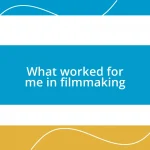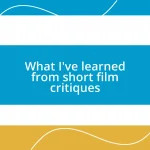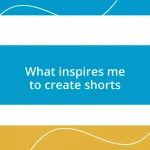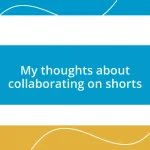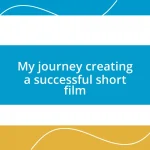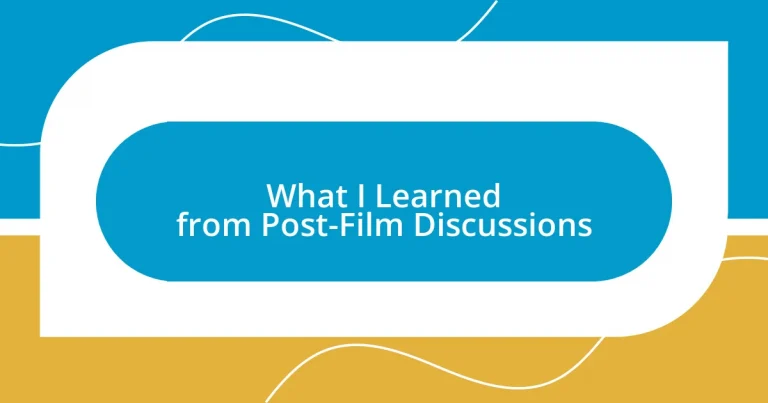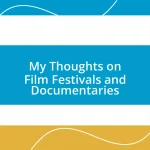Key takeaways:
- Post-film discussions foster deeper understanding, emotional connections, and personal reflections on film themes and characters.
- Key techniques for effective discussions include encouraging diverse perspectives, practicing active listening, and asking open-ended questions.
- Films can inspire transformative actions in real life, prompting engagement with broader societal issues and enhancing personal relationships through shared experiences.
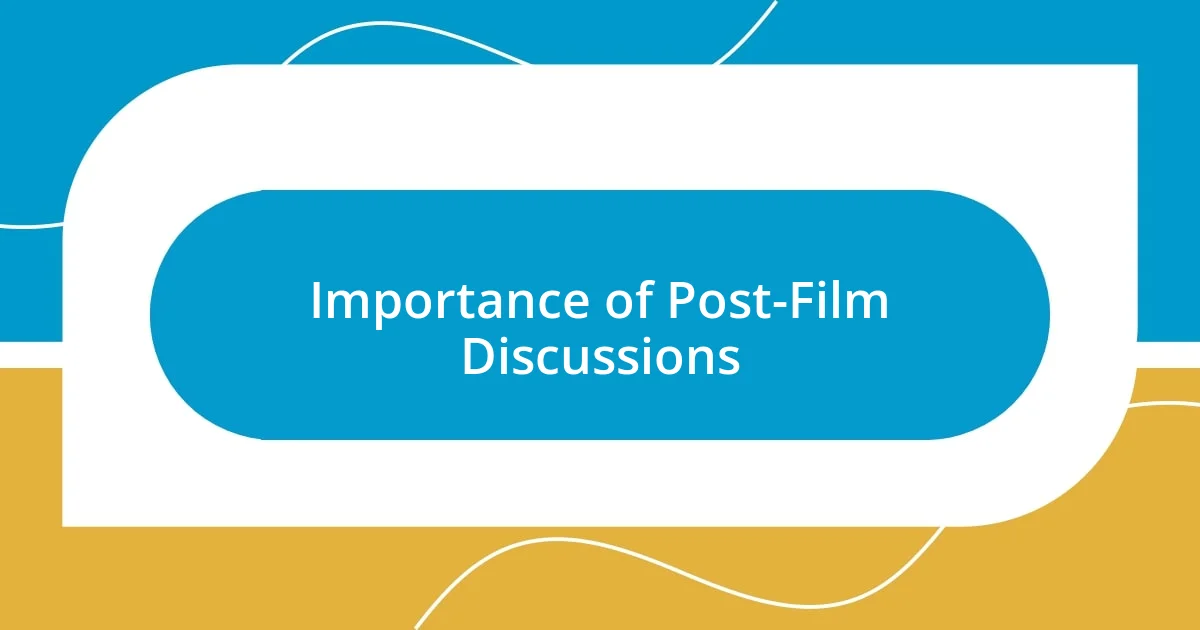
Importance of Post-Film Discussions
Post-film discussions are invaluable as they allow audiences to unpack and share their diverse perspectives on what they just experienced. I remember a time after watching a thought-provoking documentary; my friends and I spent hours dissecting the filmmaker’s choices. Was it just me, or did that particular scene leave everyone in the room utterly speechless?
Engaging in these conversations can deepen our understanding of the film’s themes and messages. I often find myself reflecting on how a powerful scene resonated with my own life experiences, sparking conversations about empathy, society, and personal growth. Isn’t it fascinating how a single film can ignite discussions around our values and beliefs?
Moreover, discussing a film collectively can amplify our emotional responses and strengthen connections with others. Just recently, a group I joined dove into the complexities of a character’s journey, which prompted me to share my own struggles related to that theme. How often do we find a mirror of our emotions in the stories told on screen?
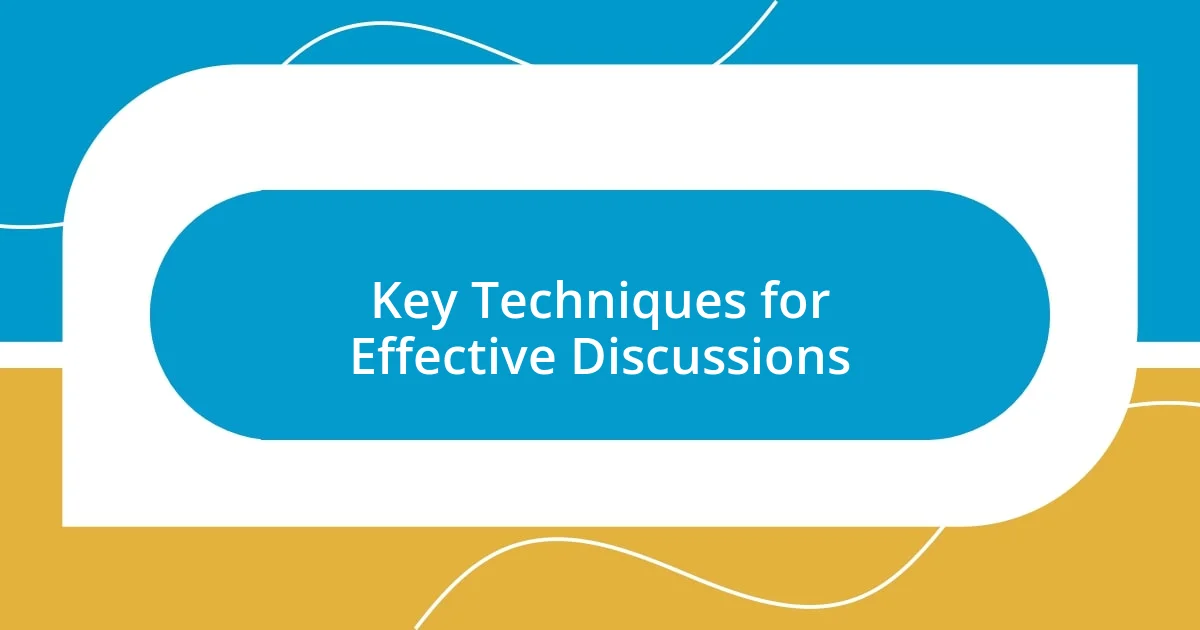
Key Techniques for Effective Discussions
In my experience, one of the most effective techniques for fruitful post-film discussions is setting a welcoming and open atmosphere. When I first started discussing films with a group, I noticed some people hesitated to share their viewpoints. It turned out that establishing ground rules—like respecting different opinions—made a noticeable difference. Everyone felt encouraged to share their thoughts without the fear of being judged.
Here are key techniques to enhance discussions:
– Encourage Diverse Perspectives: Invite everyone to share their individual interpretations.
– Active Listening: Give your full attention to others when they speak; it shows you value their input.
– Ask Open-Ended Questions: These prompt deeper reflections and prevent simple yes or no answers.
– Stay On Topic: Keep the discussion focused on the film to avoid derailing into unrelated areas.
– Share Personal Connections: Relating scenes or characters back to personal experiences can foster emotional connections.
I’ve found that when participants feel safe to express their ideas openly, the discussion flourishes, often revealing surprising insights I might have completely missed on my own.
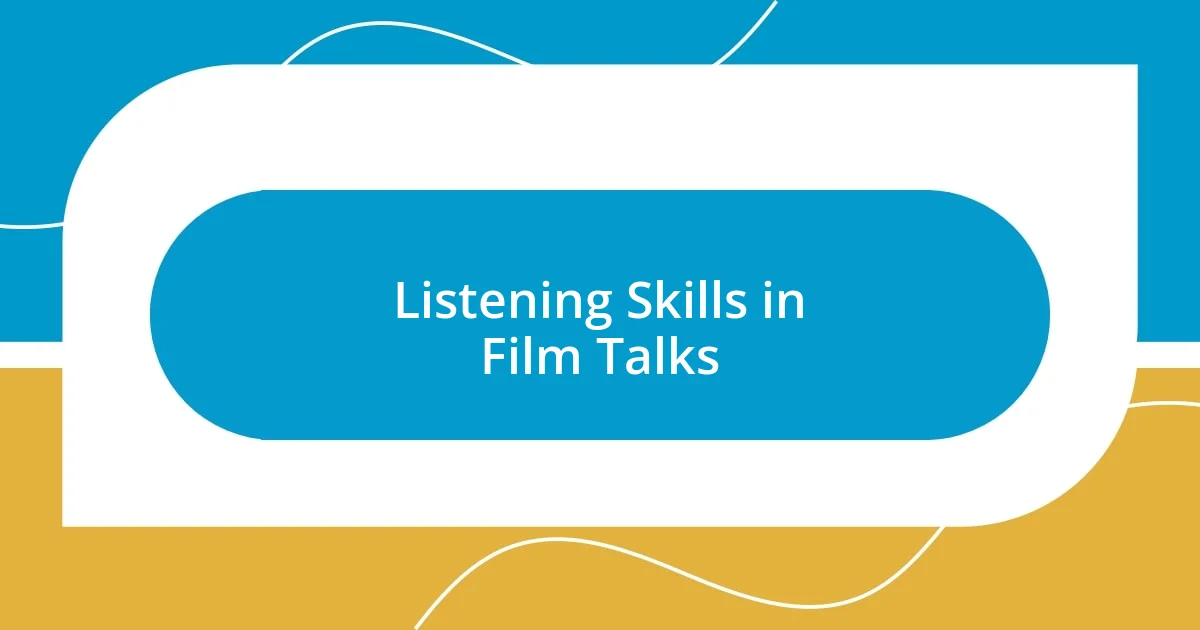
Listening Skills in Film Talks
Listening is often underestimated in the context of film discussions, yet it’s a skill I’ve honed over time. I vividly remember a discussion where someone shared how a character’s struggles mirrored their own anxieties. That moment was eye-opening for me; it made me realize that by truly listening, we can help others feel valued and heard. It’s fascinating how active listening not only fosters connections but also enhances our appreciation for the film itself.
In my experience, listening attentively allows me to grasp nuanced interpretations that I might have overlooked. One time, a participant pointed out a subtle background detail that tied directly into the film’s theme of isolation. It struck me that these small observations can often lead to profound discussions, highlighting the importance of being present and engaged. I’ve learned that when we listen, we create a dynamic dialogue where every voice enriches the conversation.
Moreover, I often find myself reflecting on how common listening barriers can hinder more meaningful exchanges. For example, during my first few discussions, I was guilty of preparing my next thought while someone else was speaking. Recognizing this tendency forced me to focus on the speaker, allowing their insights to inform my own responses rather than reacting impulsively. This shift has not only improved my listening skills but has significantly deepened my interactions with fellow film enthusiasts.
| Listening Skills | Impact on Discussions |
|---|---|
| Active Listening | Enhances engagement and understanding |
| Empathy | Allows for shared emotional connections |
| Being Present | Encourages a more enriching dialogue |
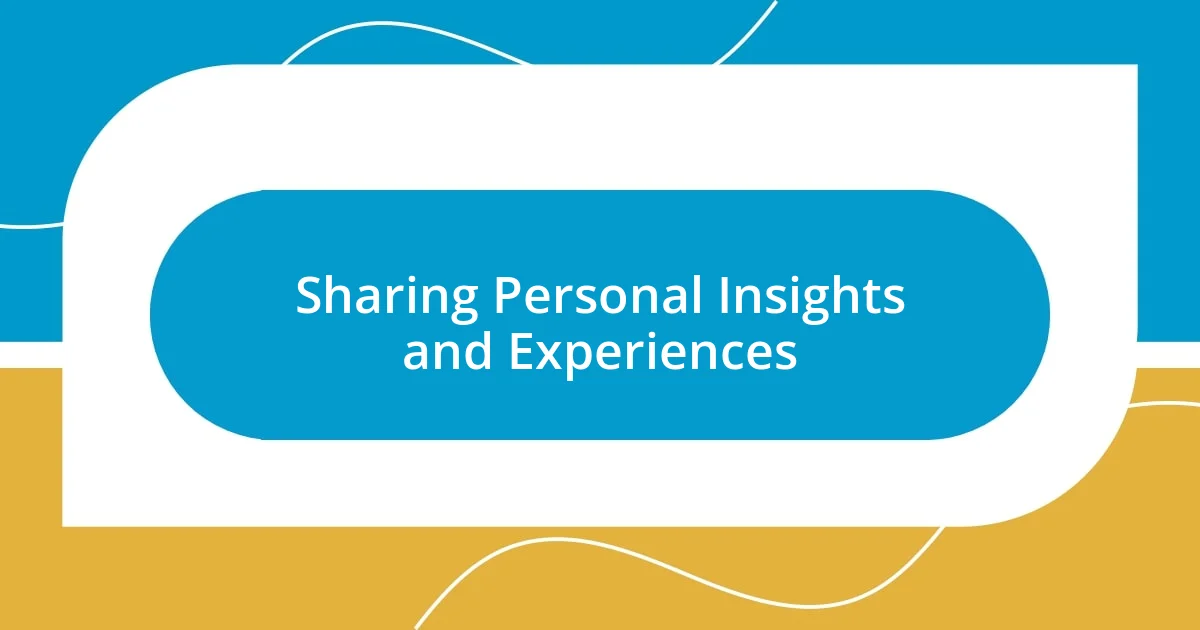
Sharing Personal Insights and Experiences
Engaging in post-film discussions has taught me the value of sharing personal experiences. I remember a time when I revealed a personal connection to a film’s theme of loss; it inspired others to open up about their own significant moments. It made me realize that when we share these intimate stories, it not only deepens our understanding of the film but also strengthens our bonds with each other. Have you ever noticed how your personal experiences can reshape the way you view a film?
In another discussion, I shared my reaction to a character’s journey of self-discovery. I expressed how their struggles mirrored my own path during a challenging phase of my life. The room shifted in energy as others responded, sharing their own stories of growth and turning points. This exchange transformed the discussion from mere plot analysis to a rich dialogue about life experiences. It struck me how powerful it is to connect film narratives to real life—it makes the discussion more relatable and impactful.
What I’ve learned is that when we talk about our personal insights, we invite authenticity into the conversation. One memorable moment for me was when someone discussed their passion for filmmaking while recounting a story of how their childhood influenced their creative choices. It encouraged me to reflect on how my interests shaped my interpretation of films. In this way, sharing personal insights becomes a bridge that connects our individual journeys to the larger cinematic landscape. How has your personal story shaped your understanding of a film?
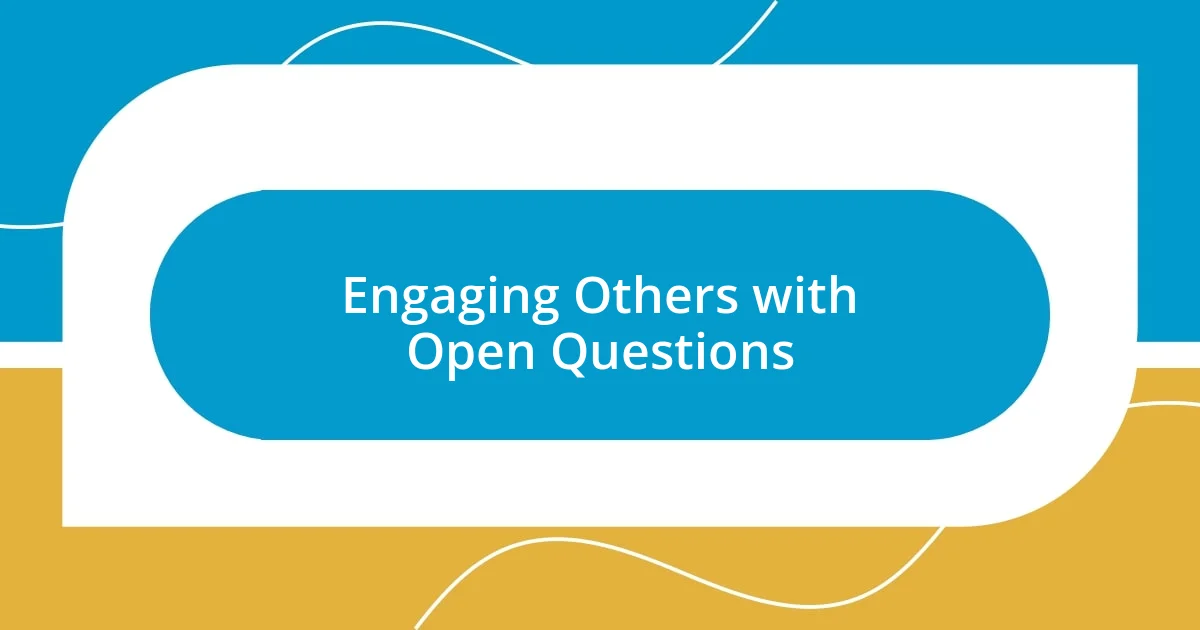
Engaging Others with Open Questions
Engaging others with open questions has been a game-changer in my post-film discussions. I’ve found that asking open-ended questions, rather than yes-or-no queries, invites deeper dialogue. For instance, after watching a film about moral dilemmas, I once asked, “What would you have done in that situation?” The varied responses revealed the complexity of human nature and showcased each participant’s values and experiences.
One memorable moment arose when I posed a question about a character’s motivations: “What do you think influenced their decisions?” This not only sparked a discussion on character development but also allowed everyone to share their interpretations. Each perspective added a layer of richness that made the conversation feel more communal. It’s remarkable how a simple question can shift the focus from just the film to the diverse minds engaging with it.
I’ve also noticed that framing my inquiries in a personal context often encourages others to reflect more deeply. For example, I once asked, “How did this film resonate with your childhood experiences?” This question opened the door for participants to relate their pasts to the film’s themes, leading to some powerful emotional exchanges. By fostering this kind of environment through open questions, I believe we cultivate not only understanding but also empathy within the group. Have you seen how powerful open-ended questions can be in stirring meaningful conversations?
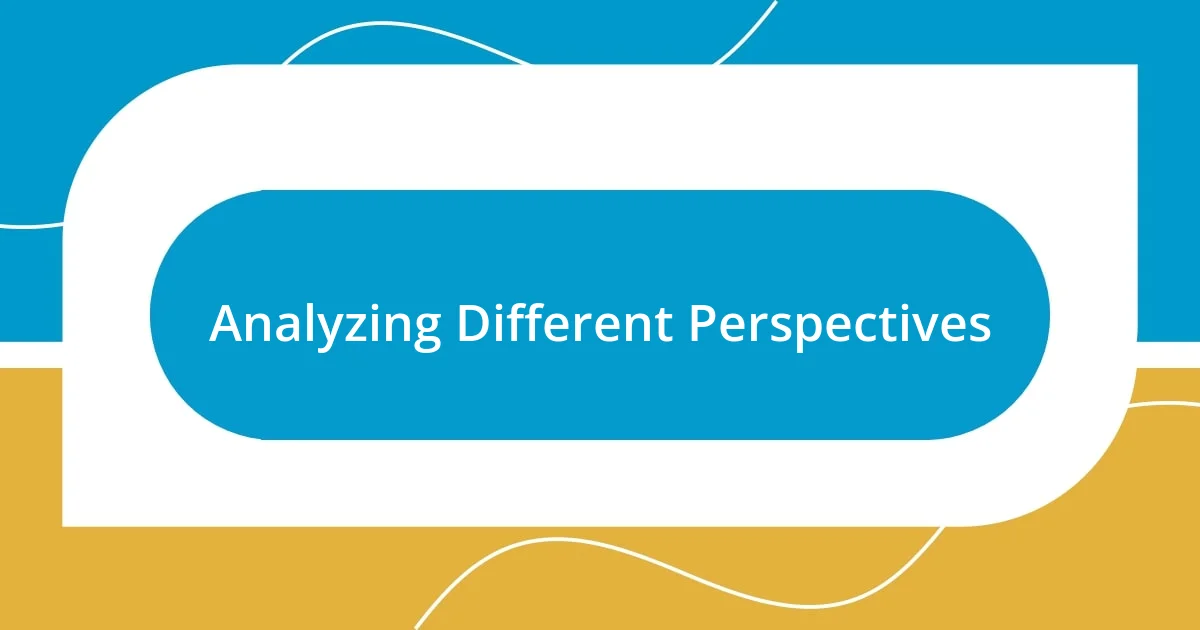
Analyzing Different Perspectives
When analyzing different perspectives in post-film discussions, I’ve discovered that each person’s background influences their interpretation of the film. During one gathering, a friend shared how their experience with a challenging upbringing shaped their view of a character’s choices. It really got me thinking—how often do we take into account someone’s life story when discussing a film? It’s these kinds of insights that remind me how nuanced our perceptions can be.
I recall an animated debate about a film depicting a dystopian society. Participants came from various fields—some were educators, others were artists—and their interpretations varied widely. I was struck by how their professions colored their viewpoints. For instance, the educators focused on the film’s commentary about systemic issues, while the artists analyzed the visual storytelling. Have you ever noticed how your profession influences your understanding of a film’s message? It’s fascinating to see how perspectives can diverge so substantially based on someone’s experiences.
By embracing diverse perspectives, I find that we enrich our discussions significantly. I once led a conversation about a poignant love story and encouraged everyone to share what love meant to them. The resulting conversations were incredible! We discussed love in the context of friendship, family, and personal sacrifice. It opened a door to understanding that concept in ways I hadn’t previously considered. This experience taught me that celebrating varying viewpoints not only enhances our film discussions but also fosters deeper human connections. How do you think engaging with diverse perspectives changes the way you appreciate a film?
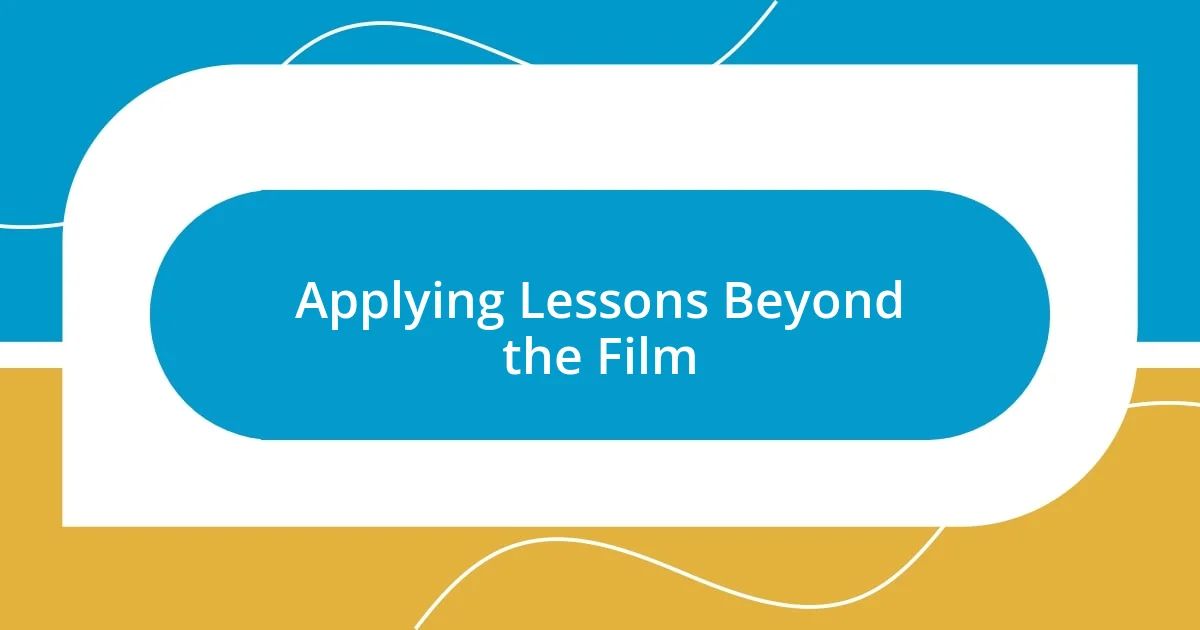
Applying Lessons Beyond the Film
Reflecting on lessons learned from films can lead to transformative experiences in our everyday lives. After discussing a powerful documentary on climate change, I felt compelled to re-evaluate my own habits. I began to wonder, “What small changes can I implement to make a difference?” This prompted me to adopt more sustainable practices, such as reducing plastic use. The realization that films can inspire real-world action has been eye-opening for me.
Diving deeper into themes presented in films has opened my eyes to broader societal issues. I remember watching a film about racial injustices and feeling a profound urge to learn more about the history behind those struggles. It made me ask, “How can I contribute to positive change in my community?” The insights gained from the film discussions became a catalyst for my involvement in local activism. This connection between film and social responsibility underscored the importance of reflecting on what we consume.
I also find the lessons from these discussions can enhance my personal relationships. A friend and I once watched a film about reconciliation and forgiveness. It sparked an honest discussion about our own experiences with forgiveness, so we explored our past conflicts. I realized how a shared cinematic experience can open doors to vulnerability and honesty. Reflecting on these narratives helps me navigate my own life with greater empathy. Don’t you think that films can push us to confront our own truths?
